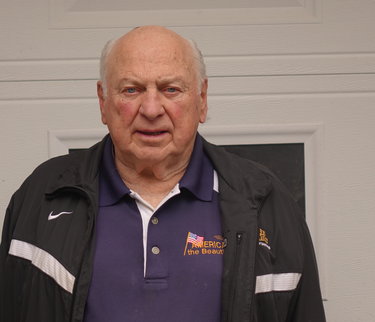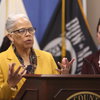Hilltown help is still available for domestic abuse victims as cases rise
ALBANY COUNTY — Richard Umholtz — former co-president of the Helderberg Interfaith Safe Haven, a group that helped shelter victims of domestic violence and provided resources like food, clothing, education, and more — has news for people at risk of violence while isolated at home: Call him any time, and he and his associates will offer protection and the other resources that Safe Haven had provided for 20 years.
Helderberg Interfaith Safe Haven originated in 1992 under a wide group of people hoping to provide critical aid to those afflicted by violence. In addition to Umholtz, members included the board’s first president, Reverend Don Lyon of the Westerlo Baptist Church; former Altamont Chief of Police George Pratt; Doctor Margery Smith of Berne; former Altamont mayor Paul DeSarbo; Kathy Bishop, who provided crucial administrative support, Umholtz said; and always two survivors of domestic abuse who could provide insight into the situations the board was confronted with.
The group housed women in need of escape at the Father Peter Young Facility on Route 146, between Altamont and Knox, where the board had set up an apartment with furniture and appliances donated by local vendors. When the facility fell into disrepair and providing shelter there was no longer feasible, the group ceased its formal operation.
But as social distancing has created a spike in domestic violence calls, as reported by Albany County Sheriff Craig Apple, Umholtz says that he can use his contacts to put together a safe environment for people trapped at home with abusers, and provide almost all the same resources as before.
“It could be pretty quick,” Umholtz told The Enterprise of recreating a hidden shelter. “I feel pretty confident with the cooperation I see [in response to the pandemic].”
In addition to the shelter, Umholtz said, victims will be provided food and clothing, and will be assisted in obtaining other resources like counseling.
“We were organized to provide a safe haven for domestic violence victims,” Umholtz said of the group. “We also helped raise their self-esteem, provided educational opportunities, employment, and health care.”
Umholtz explained that, once, he received a call in the middle of the night from a victim who had a brief moment of respite when her partner went out to get more beer, leaving Umholtz with a short window of time to retrieve the victim and bring her to safety.
“We helped probably 75 to 100 people a year,” Umholtz said.
Those 75 -to-100 people per year may now be faced with extraordinary circumstances as they’re shut in with their abusers and are no longer able to escape through work or school.
County calls down
Although Sheriff Apple said that his office has received more calls regarding domestic abuse since social-distancing measures in Albany County first took effect, the county’s Crime Victim and Sexual Violence Center is getting fewer calls, according to Director Karen Ziegler.
“Before the pandemic, we would average 80 crisis hotline calls and 40 emergency-room accompaniments per month,” Ziegler told The Enterprise. “[Now,] we are experiencing a significant reduction in calls. We are getting less than half of the expected hotline calls and very few requests to provide support for victims in the emergency room.”
Although the sheriff’s office could not be reached for more information about domestic-abuse calls, The New York Times reports that there has been a significant increase in incidents across the globe as each country has issued isolation orders.
Ziegler said that the reduction in calls may be a result of fear of going to a hospital, where it seems the chance of exposure to the coronavirus is higher than anywhere else, but she stressed that hospitals are an important resource, especially for rape victims. She added that many callers seem anxious about the availability of resources in a world that has been swiftly turned upside down.
“It is my understanding that all local hospitals are providing forensic rape exams and medical support to all victims,” Ziegler said. “Evidence collection happens at the hospital … I believe that hospitals are practicing universal basic health-care precautions so that people may access services.”
Still, those who live with domestic abusers are forced to adopt new strategies of escaping or minimizing abuse as old strategies, like staying out of the house as much as possible for things like work or school, are no longer feasible.
“There really is no one right answer for every situation,” Ziegler said of how to deal with abusers while stuck in close proximity. “Challenging an abuser is often more dangerous. The loss of control over their partner [or] victim may trigger greater violence.”
Central to her theory, here, is the idea that much abuse stems from a desire for power or control, which she said might be especially pertinent now as people are faced with a crisis that not only threatens their physical health, but their financial and emotional well-being.
While Ziegler said she doesn’t have information at this point about whether there’s an increase in first-time abuse incidents, she said that “as abuse can take many forms, there is almost always non-physical abuse before or with physical abuse. Psychological abuse, financial abuse, emotional abuse, using medical needs as leverage are very common in these types of relationships. Given the financial and medical uncertainty of these times, this may be heightened.”
Still, she doesn’t think that the undue stress on family members and live-in partners will create an increase in abuse that lasts past the social-distancing period.
“If a partner acts out due to overwhelming stress, and there has been no instances of any kind of abuse prior,” Ziegler said, “it is unlikely for this to evolve into an abusive relationship. [The perpetrator] would be ashamed and unhappy with that behavior and show genuine remorse.
“Interpersonal violence is about power and control,” Ziegler continued. “It will have been a part of the relationship in one way or another. Like alcohol abuse or mental illness, stress doesn’t cause relationship violence, even though it may co-occur.”
Ziegler noted that the Crime Victim and Sexual Violence Center’s website has important numbers to call and useful advice for those who are stuck at home with an abuser. The center runs a 24/7 sexual assault hotline, staffed by volunteers who are trained for counseling, as well as legal and medical advocacy. Anyone 18 or older can sign up for training, according to the website.
Ziegler also referred to the National Domestic Violence Hotline’s advice on safety planning, which spans from knowing where nearby public phones are to keeping one’s car backed up in the driveway with the doors unlocked and enough fuel to get to a safe location.
“Although some of the things that you outline in your safety plan may seem obvious,” the site reads, “it’s important to remember that in times of crisis your brain doesn’t function the same way as when you are calm. When adrenaline is pumping through your veins it can be hard to think clearly or make logical decisions about your safety.”
****
Where victims of abuse can call for help:
— When in an emergency, dial 9-1-1;
— Dick Umholtz may be reached at his home number of 518-872-1872, or on his cell at 518-915-5166;
— Albany County Crime Victim and Sexual Violence Center 24/7 Sexual Assault hotline: 518-447-7716;
— New York State Domestic Violence and Sexual Assault Hotline: 1-800-942-6906.



